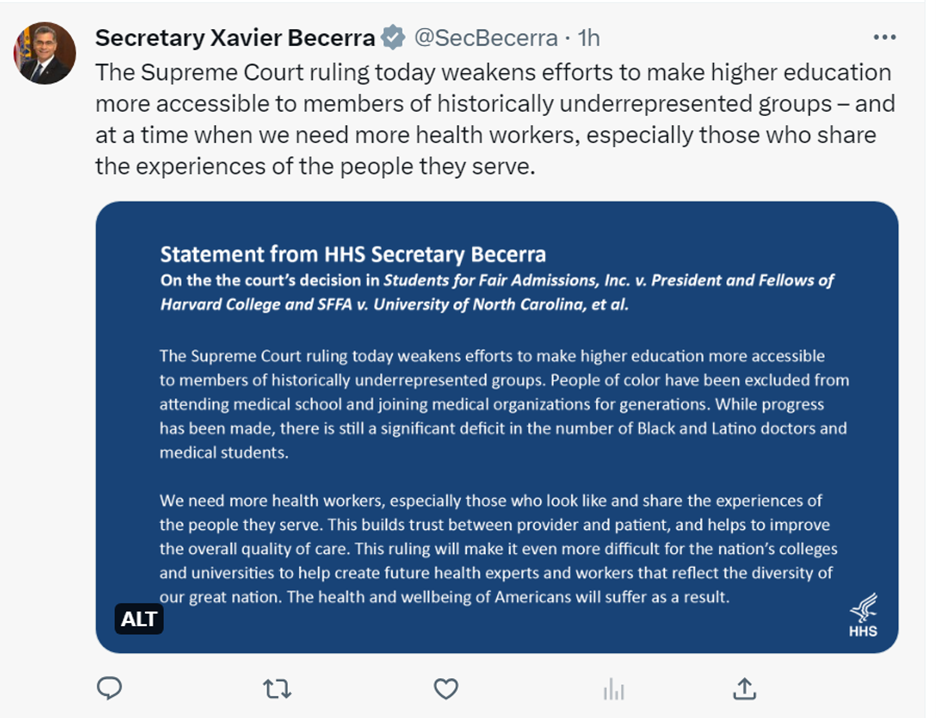Department of Health and Human Services Secretary Xavier Becerra condemned the Supreme Court’s decision banning affirmative action in higher education admissions, saying it will diminish health equity by hurting the country’s medical education system.
“The Supreme Court ruling today weakens efforts to make higher education more accessible to members of historically underrepresented groups — and at a time when we need more health workers, especially those who share the experiences of the people they serve,” said Becerra in a tweet that was deleted one hour after publication. The Washington Examiner obtained a screenshot of the Tweet.
‘BIDENOMICS’: FACT-CHECKING BIDEN’S 2024 ECONOMIC PITCH

Chief Justice John Robert wrote the majority opinion for the 6-3 decision released on Thursday, arguing that the affirmative action practices at both Harvard University and the University of North Carolina violate the Equal Protection Clause of the 14th Amendment.
“People of color have been excluded from attending medical school and joining medical organizations for generations,” Becerra said. “We need more health workers, especially those who look like and share the experiences of the people they serve. This builds trust between provider and patient, and helps to improve the overall quality of care.”
Becerra also said that medical schools lack the number of minority students needed to adequately represent the broader population.
In the 2018-2019 school year, 45.4% of medical students identified themselves as non-white. Although the largest minority category at 21.6% is Asian students, 6.2% identify as black, 5.3% identify as Hispanic, and 8% identify as multiracial or multi-ethnic.
The American Association of Colleges of Nursing estimated that in the 2020-2021 academic year, 40.8% of entering baccalaureate nursing students identified as a racial minority, along with 38.9% of nursing masters students, 35.5% of nursing research doctoral students, and 38.9% of doctors of nursing practice (DNP).
Among practicing nurses, black practitioners account for 6.7% of RNs and 17.2% of LPNs or LVNs. 10% of LPNs or LVNs are Hispanic.
Calling for race-conscious medical training is a growing trend. In May, the New England Journal of Medicine published an article concluding segregating white, black, and other racial minority groups into different medical classes is essential for addressing systemic racism in medical practice and education.
“Especially as we seek to recruit more medical students who are [black and indigenous people of color or BIPOC], we need to recognize [systemic racial] harm and encourage pedagogical approaches that support the needs of BIPOC learners,” explain the administrators of the University of California San Francisco School of Medicine.
CLICK HERE TO READ MORE IN THE WASHINGTON EXAMINER
At the first HHS summit on LGBT health on Monday, Becerra noted the importance of intentionally infusing equity into every facet of medical and scientific work to achieve desired outcomes. “Equity must be by design in everything we do,” said Becerra.
In the context of affirmative action in higher education, Becerra said that Thursday’s “ruling will make it even more difficult for the nation’s colleges and universities to help create future health experts and workers that reflect the diversity of our great nation. The health and wellbeing of Americans will suffer as a result.”

